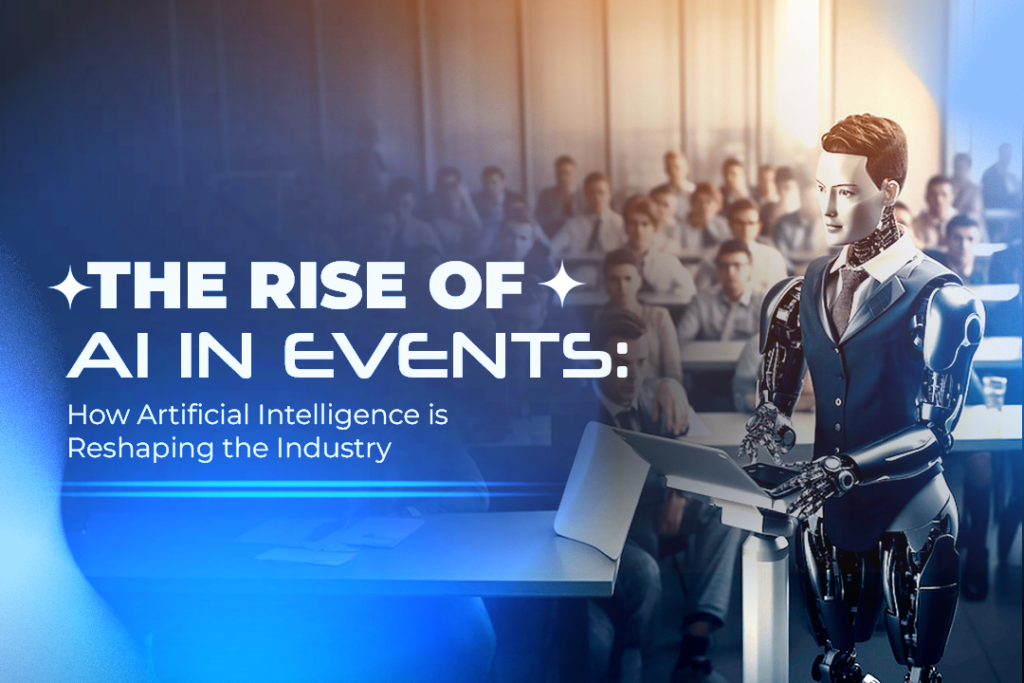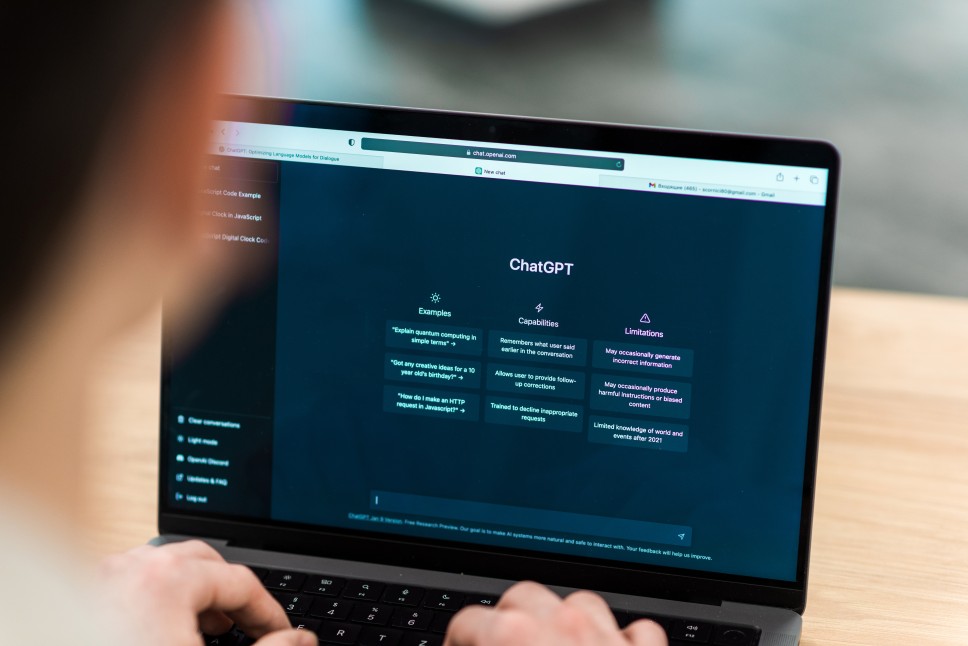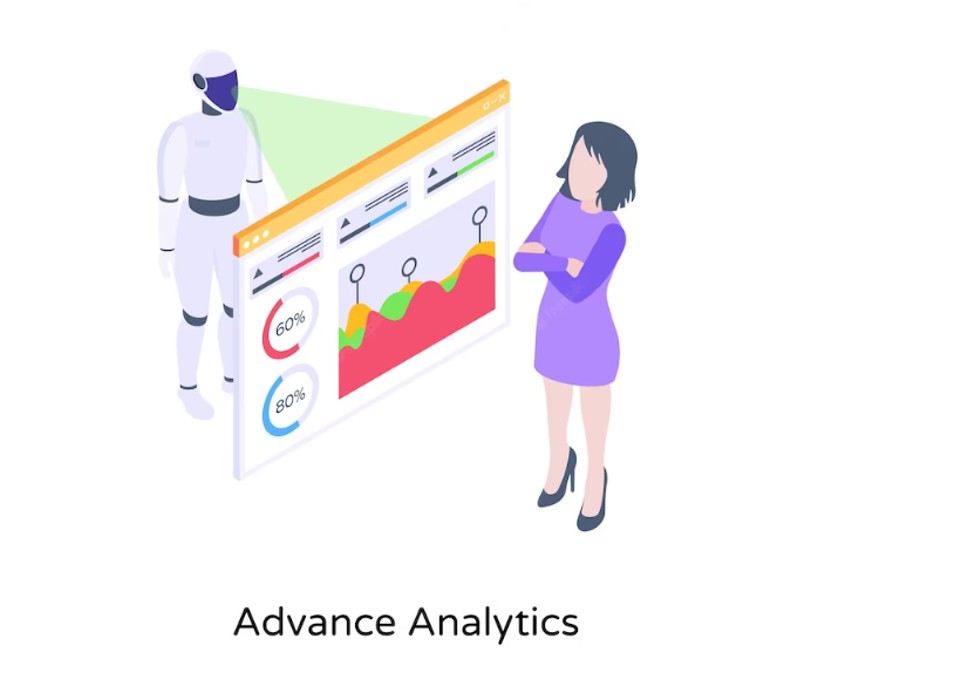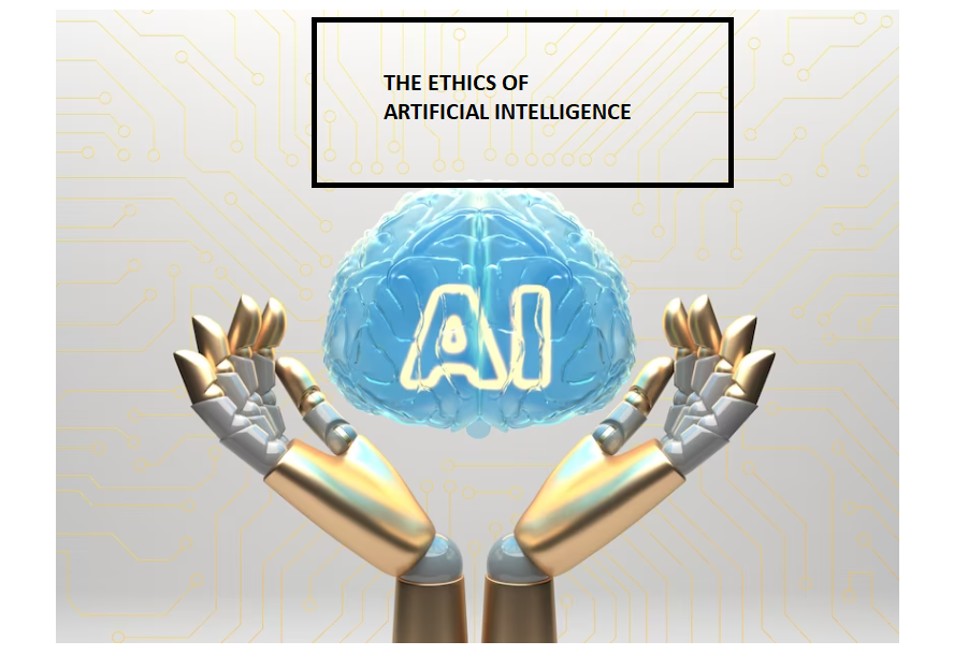
In today’s fast-paced world, rapid advancements are transforming artificial intelligence (AI) in events. This cutting-edge technology is reshaping the landscape of event planning, organization, and execution, bringing many exciting opportunities and benefits.
AI is a game-changer for event professionals worldwide, enhancing attendee experiences and streamlining logistical operations. In this article, we will explore AI’s tremendous potential in events and delve into the myriad ways it is revolutionizing the industry, propelling it toward a future of unparalleled efficiency and innovation.
So, let’s embark on this journey of discovery, embracing the positive impact of AI on events and uncovering the incredible possibilities it holds.
What is Artificial Intelligence?
It is the simulation of human intelligence in machines programmed to think and learn like humans. It encompasses a wide range of technologies, such as machine learning, natural language processing, and computer vision, enabling machines to analyze data, make decisions, and perform tasks without explicit human intervention.
Regarding the events industry, AI has emerged as a transformative force, revolutionizing how events are planned, executed, and experienced. Event organizers can harness the power of AI to streamline various processes, saving time and resources.
Integrating AI in the events industry marks a significant transition from traditional event management practices to a more efficient, personalized, and data-driven approach. As AI continues to evolve and expand its capabilities, the industry stands to benefit greatly, offering attendees unforgettable experiences and organizers unparalleled efficiency and success.
The Role of AI in Event Planning and Management
In the realm of event planning and management, AI has become a major player and has changed the landscape in previously unimaginable ways.
At the heart of event planning are myriad tasks that require meticulous attention to detail and precise execution. AI is proving a reliable ally, taking on the burden of repetitive and time-consuming administrative tasks. Let’s find out how.
- Streamlined Administrative Tasks: AI-powered event management platforms automate and handle time-consuming administrative duties, such as registration and attendee communication, freeing organizers to focus on more strategic aspects of event planning.
- Personalization at Scale: AI can analyze extensive datasets to identify individual preferences and behaviors, enabling event organizers to create personalized event experiences for each attendee, fostering stronger connections and leaving lasting impressions.
- Enhanced Attendee Engagement: AI-driven chatbots and virtual assistants provide instant support and information to event attendees, improving their overall experience and reducing the need for human intervention in handling routine queries.
- Data-Driven Decision Making: AI’s ability to process and analyze large volumes of data in real time empowers event organizers to gain valuable insights from attendee feedback and social media interactions, facilitating data-driven decision-making for future events.

- Optimal Content and Session Recommendations: AI algorithms analyze attendee preferences and past event data to suggest relevant sessions and content, ensuring that attendees get the most out of the event with personalized recommendations.
- Efficient Resource Management: AI’s predictive capabilities help organizers optimize resource allocation, such as venue space, catering, and staffing, based on historical data and projected attendee numbers, reducing wastage and costs.
- Real-Time Monitoring and Feedback: AI sensors and analytics tools allow event organizers to monitor attendee movement and engagement during the event, facilitating quick adjustments to optimize the event experience.
- Fraud Detection and Security: AI-powered algorithms can detect suspicious behavior and potential fraud during registration and check-in processes, enhancing event security and reducing risks.
- Post-Event Analysis and Reporting: AI-generated reports provide comprehensive insights into event performance, attendee satisfaction levels, and areas for improvement, aiding organizers in refining their future event strategies.

- Innovation and Future Growth: Embracing AI in event planning sets the stage for continuous innovation and improvement. As an innovative tool, it unlocks the potential for even more impactful and memorable events.
AI’s integration into event planning and management brings unprecedented efficiency, personalization, and data-driven decision-making. AI in events propels the industry into a new era of dynamic and unforgettable experiences.
How do you Enhance Attendee Engagement with AI?
Enhancing attendee engagement with AI involves leveraging the technology’s capabilities to create personalized and interactive experiences that resonate with each participant. Here are several ways to achieve this:
- Personalized Recommendations: AI can analyze attendee preferences, interests, and past interactions to suggest relevant sessions, workshops, and networking opportunities. Tailoring event schedules to individual preferences can help attendees engage with content that aligns with their interests, leading to a more fulfilling experience.
- AI-Powered Chatbots: Integrate AI-driven chatbots into event communication channels to provide instant support and information. Attendees can get quick answers to their queries, whether they’re about event logistics, session details, or networking opportunities. The chatbot can also provide attendee reminders, enhancing their overall experience and reducing wait times.
- Virtual Assistants: Implement virtual assistants that guide attendees throughout the event. These assistants can provide personalized recommendations, help navigate the venue, and offer real-time updates on event activities, ensuring attendees stay informed and engaged.
- Gamification: Use AI algorithms to create interactive challenges, quizzes, or scavenger hunts to infuse the event with gamification elements. AI can help incentivize attendees to participate actively by incorporating rewards and leaderboards, fostering a sense of competition and excitement.

- Interactive Content and Surveys: Utilize AI-powered interactive content formats, such as live polls, Q&A sessions, and surveys. This encourages attendee engagement and provides valuable real-time feedback for event organizers to make immediate improvements.
- AI-Generated Content: Employ AI to generate dynamic content, such as personalized videos or tailored event recaps, based on each attendee’s interests and interactions during the event. This customized touch creates a sense of exclusivity and increases engagement.
- Augmented Reality (AR) Experiences: Integrate AI-driven AR experiences at the event to provide immersive and interactive elements. AR can enhance presentations, showcase products, or offer engaging virtual tours, captivating attendees and leaving a lasting impression.

Pic Courtesy: Pexels
- Networking Facilitation: Use AI-powered networking platforms to match attendees based on shared interests and goals. By facilitating meaningful connections, attendees are more likely to engage in productive discussions and build valuable relationships.
- Sentiment Analysis: Use sentiment analysis to monitor attendees’ emotions and sentiments during the event through social media data or feedback forms. This data helps organizers identify areas of success and areas that need improvement, ensuring future events are even more engaging.
- AI-Enhanced Entertainment: Incorporate AI-generated or AI-augmented entertainment elements into the event, such as AI-generated music playlists or interactive AI-powered art installations. These unique experiences captivate attendees and make the event memorable.
Event organizers can create highly personalized and engaging experiences for attendees, fostering connections, excitement, and memorable moments throughout the event. If you’re a B2B event marketer who is planning your next event, read our article, “18 Great Experiential Marketing Examples To Inspire Your Next Event“, which will provide you with practical examples of applying experiential marketing strategies while planning an event.
How do you Leverage AI for Data Analysis and Insights?
Leveraging AI for data analysis and insights involves harnessing the power of artificial intelligence to process vast amounts of data quickly and accurately, extracting valuable patterns, trends, and actionable insights. Here are some key steps in utilizing AI for data analysis:
- Data Collection and Preparation: Gather relevant data from various sources, including event registrations, attendee feedback, social media interactions, and website analytics. Clean, organize, and prepare the data for analysis to eliminate inconsistencies or errors.

Pic Courtesy: Freepik
- Machine Learning Algorithms: Employ machine learning algorithms to analyze the data. Different algorithms, such as clustering, regression, classification, or natural language processing, can extract insights from structured and unstructured data.
- Predictive Analytics: Utilize AI-powered predictive analytics to forecast attendee behavior, event attendance, or trends. These predictions can aid in making informed decisions, optimizing resource allocation, and tailoring event experiences to meet attendee preferences.
- Real-Time Analytics: Implement AI tools such as Eventtus, Pathable, Loops, Feathr, etc., that provide real-time analytics during the event. These tools can monitor attendee engagement, sentiment, and interactions in real-time, enabling organizers to make immediate adjustments to enhance the event experience.
- Sentiment Analysis: Apply AI-driven sentiment analysis to gauge attendee sentiments from social media posts, event website data, and surveys. This helps understand attendee satisfaction levels, identify pain points, and take proactive measures to address concerns.
- Personalization: Utilize AI to segment attendees based on their preferences, behavior, and interactions. Event organizers can deliver personalized content, recommendations, and experiences by understanding each attendee’s interests and preferences.
- Data Visualization: Present data insights using AI-powered data visualization tools. Some of these tools are Tableau, Power BI (Microsoft), Qlik Sense, Domo, Sisense, Looker (Google Cloud), and similar tools. Visual representations of data, such as charts, graphs, and heatmaps, make complex information more accessible and enable organizers to comprehend patterns and trends easily.
- Pattern Recognition: Apply AI algorithms to identify patterns and correlations within the data that might not be apparent through manual analysis. These patterns can uncover hidden insights and inform decision-making for future events.
- Anomaly Detection: Implement AI-driven anomaly detection techniques to identify unusual patterns or deviations from the norm in the data. Detecting anomalies can help identify potential issues, security breaches, or fraud in real time.

- Continuous Improvement: Continuously refine and update AI models as more data becomes available. Learning from new data and adjusting algorithms can help AI evolve enough to provide more accurate and relevant insights over time.
Leveraging AI for data analysis and insights can help event planning teams better understand attendee behavior, preferences, and event performance. This leads to data-driven decisions and improved event experiences. AI’s ability to process data at scale and discover hidden patterns empowers organizers to optimize events, enhance engagement, and deliver exceptional experiences to attendees.
Navigating Ethical Considerations and Challenges in AI-Driven Event Management
As AI takes center stage in event management, it is crucial to acknowledge and address its implementation’s ethical considerations and challenges.

While AI offers immense potential for enhancing attendee experiences and optimizing event operations, certain ethical concerns must be carefully considered. Here are some key considerations:
- Data Privacy and Security: AI relies heavily on data, often including personal information about event attendees. Ensuring the privacy and security of this data is critical to protect individuals’ sensitive information from potential breaches or misuse.
- Bias and Fairness: AI algorithms are trained on historical data, which can inadvertently perpetuate biases. This can lead to unfair treatment or discrimination in various aspects of event planning, such as attendee recommendations or resource allocation.
- Transparency and Explainability: AI algorithms can be complex, and it is challenging to understand the reasoning behind their decisions. Openness and explainability are crucial, especially when AI is used in critical decision-making processes.
- Informed Consent: Organizers must obtain informed consent from individuals when collecting and using attendee data for AI-driven insights. Attendees should be informed about how their data will be used and can opt out.
- Job Displacement: As AI automates certain tasks in event management, concerns about job displacement for human workers may arise. Ethical considerations are crucial to balancing AI-driven efficiency and maintaining a human workforce.
- Unintended Consequences: The use of AI in events can have unintended consequences, especially if the technology needs to be properly tested and monitored. Being aware of potential risks and conducting thorough testing can mitigate these challenges.
- Data Bias in Personalization: While personalization can enhance attendee experiences, there is a risk of creating echo chambers or reinforcing existing preferences without exposing attendees to diverse perspectives and content.
- Unforeseen Errors: AI systems are flexible and sometimes make errors or misinterpret data. Organizers must have contingency plans to address potential AI failures and prevent adverse impacts on event experiences.

- Overreliance on AI: Relying too heavily on AI systems can lead to a lack of human judgment and oversight, potentially overlooking critical factors or unique circumstances that require human intervention.
- Ethical Decision Making: AI is a tool, and the ethical considerations ultimately lie with the individuals using it. Ensuring that event organizers and AI developers adhere to ethical guidelines and principles is crucial in preventing misuse or unintended negative consequences.
Event organizers can harness AI’s power to enhance attendee experiences by proactively addressing these ethical considerations and challenges. This should be done while safeguarding individual rights and promoting transparency in event management practices.
Real-world examples of AI in events
AI has become a driving force in reshaping the events industry, transforming how events are planned, managed, and experienced. These two real-world case studies exemplify AI’s remarkable potential for creating enhanced and innovative event experiences.
From data-driven insights to personalized interactions, these examples demonstrate how AI is revolutionizing event management and elevating attendee engagement to new heights. Let’s investigate these fascinating case studies to witness AI’s impact on the events landscape.
Case Study 1: IBM Watson at the Masters’ Golf Tournament
Event: The Masters’ Golf Tournament
AI Implementation: IBM Watson
In 2016, the Masters’ Golf Tournament, one of the most prestigious golf events globally, collaborated with IBM Watson to provide a unique and interactive experience for on-site attendees and online viewers. IBM Watson, a powerful AI system, analyzed vast amounts of historical and real-time data, including player performance, weather conditions, and spectator behavior.
IBM Watson’s natural language processing capabilities enabled attendees and online viewers to interact with the AI-powered chatbot. The chatbot answered questions, provided real-time updates, and offered personalized recommendations for players based on their individual preferences.
Moreover, IBM Watson’s predictive analytics offered insightful data on player performance, enabling fans to make more informed decisions when placing bets or selecting their fantasy golf teams. This AI-driven enhancement elevated the overall attendee experience, making the Masters’ Golf Tournament a truly immersive and data-driven event.
Case Study 2: Google’s AI-Powered Live Captioning at Google I/O
Event: Google I/O Developer Conference
AI Implementation: Google’s AI-Powered Live Captioning
Google I/O is an annual developer conference organized by Google, where the tech giant unveils its latest innovations and technologies. In 2019, Google introduced an AI-powered live captioning feature for all keynote presentations and sessions during the event.
This AI-driven accessibility enhancement utilized Google’s speech recognition technology to generate real-time captions for every spoken word during presentations. The captions were displayed on large screens, ensuring that attendees with hearing impairments could fully participate and understand the presented content.
The live captioning feature also benefitted attendees whose native language was not English, as they could more easily follow along with the presentations. Google’s AI-powered live captioning showcased AI’s positive impact on creating an inclusive and accessible event experience for all attendees, regardless of their hearing abilities or language preferences.
Key Takeaway
The rise of AI in the events industry is a defining moment in the industry’s evolution. The integration of AI is a technological advancement and a fundamental shift redefining how events are planned, executed, and experienced. Balancing the use of AI capabilities with maintaining the human touch is critical to delivering successful and meaningful event experiences.
As AI continues to advance and innovate, the future holds limitless possibilities. The events industry can harness AI’s potential while remaining mindful of the ethical implications. This can lead to a brighter, more inclusive, and technologically empowered future. Also, keep up with the latest information related to the event industry at Eventible.




Comments are closed.